Disclosure: This article contains affiliate links. We may earn a commission from purchases at no extra cost to you, which helps our travel content.
Standing at the edge of Lac Assal, 155 meters below sea level, with salt crystals crunching beneath my boots and the stark volcanic landscape stretching to the horizon, I couldn't believe this otherworldly experience was costing me less than a night out in Glasgow. Djibouti might be one of Africa's smallest countries, but this former French territory packs an outsized punch for adventurous travelers willing to navigate its rough edges. As a surveyor who's mapped spaces from Barcelona's Gothic Quarter to Berlin's underground clubs, I've developed an eye for places where geological wonders and cultural crossroads create something truly unique – and Djibouti delivers this in spades without emptying your wallet.
Navigating Djibouti City on a Shoestring
Djibouti City hits you like a blast of desert heat – chaotic, colorful, and surprisingly compact. The capital's European Quarter showcases French colonial architecture alongside modern developments funded by the city's strategic port position. Rather than splurging on taxis, I navigated the city like locals do: shared minibuses called dababs cost roughly 50 DJF (about $0.28) per trip and connect most major points. For longer explorations, I rented a basic bicycle from my hostel for 1000 DJF ($5.60) per day.
The heart of budget exploration is Les Corniches, the seafront district where fishermen haul in their daily catch and local families stroll during the cooler evening hours. Here, I discovered small food stalls selling foull (fava bean stew) and lahoh (sourdough pancakes) for pennies. When mapping out my daily routes, my solar power bank proved invaluable – Djibouti's abundant sunshine meant I never worried about keeping my phone charged for navigation and photography.
For accommodations, skip the overpriced tourist hotels and head to the African Quarter where I found a clean, basic room at Auberge du Héron for $15 per night. The owner, Omar, doubles as an unofficial city guide if you buy him a coffee and show genuine interest in local history.
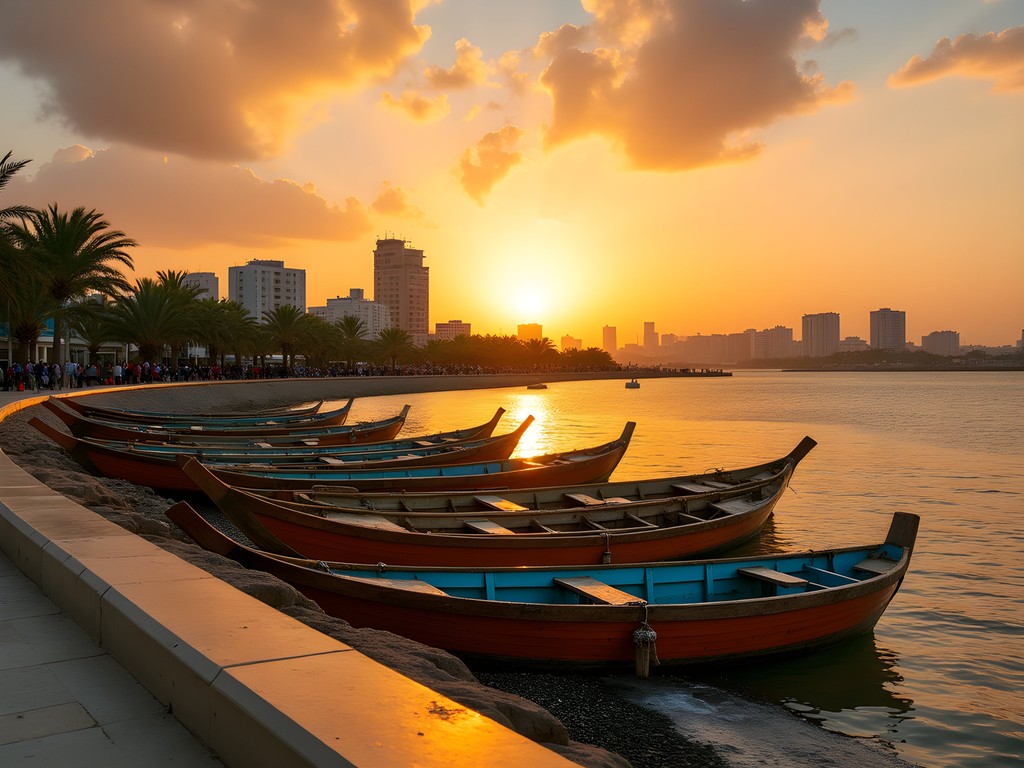
💡 Pro Tips
- Download maps.me for offline navigation as Google Maps isn't always reliable here
- Carry a reusable water bottle with built-in filter – tap water isn't safe but filtered water saves money
- Learn basic French phrases – it's more widely spoken than English
Market Immersion: Nightlife Meets History
My professional fascination with how spaces transform from day to night found its perfect expression in Djibouti's Central Market. By day, it's a practical shopping hub, but as sunset approaches, the narrow pathways between stalls become an impromptu social arena where centuries-old trading traditions blend with modern commerce. The market sits within structures that show clear Ottoman influences, with later French colonial modifications creating fascinating architectural juxtapositions.
Arriving around 4pm lets you witness the transition as day vendors pack up and evening merchants set out their wares. The spice section assaults your senses – towering pyramids of vibrant powders whose names I struggled to pronounce but whose aromas told stories of ancient trade routes. I purchased a custom spice blend for about 200 DJF ($1.12) that I'm still using months later in my Glasgow kitchen.
For budget dining, follow locals to the food stalls at the market's eastern edge. Here, 500 DJF ($2.80) buys a hearty plate of skoudehkaris (spiced rice with meat) that rivals meals I've paid twenty times more for in European cities. Staying hydrated in Djibouti's heat is essential – my insulated water bottle kept water cold all day and its purification system gave me peace of mind when refilling from questionable sources.
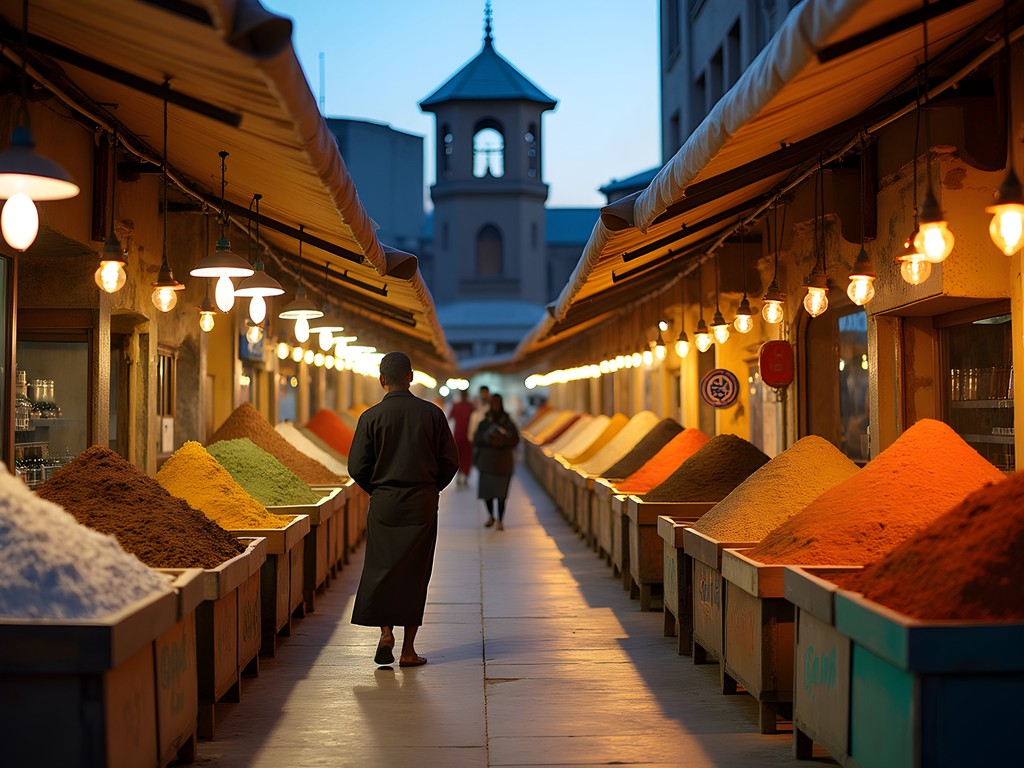
💡 Pro Tips
- Visit the market twice – once in morning and once at dusk to see its dual personalities
- Bring small bills for easier haggling
- Ask permission before photographing vendors – a small purchase usually earns you photo privileges
Geological Wonders on a Budget
Djibouti's otherworldly landscapes are its true treasure, and experiencing them doesn't require expensive tours. Lac Assal, Africa's lowest point and one of the world's saltiest lakes, sits just 120km from the capital. Rather than booking through hotels, I arranged transport with three fellow backpackers I met at my hostel. We negotiated with a local driver for 8000 DJF (about $45) total for a day trip – splitting it four ways made it remarkably affordable.
The landscape surrounding Lac Assal feels genuinely Martian – black volcanic rocks contrasting with the white salt flats and the lake's turquoise waters. My surveyor's eye was drawn to how the lake's recession has created distinct geological layers visible in the shoreline. The salt concentration is so high that you float effortlessly, though I recommend bringing your own fresh water for rinsing afterward – the salt crystallizes on skin painfully quickly under the intense sun.
For overnight excursions to more remote sites like Lake Abbé (famous for its limestone chimneys), basic camping is the budget option. I invested in a ultralight tent before my trip – weighing just over 2kg, it barely took up space in my pack but provided crucial shelter for nights under Djibouti's star-filled skies. When camping near Lake Abbé, local Afar tribespeople offered to guide us to the best viewing points for about 1000 DJF ($5.60) – money well spent for both the knowledge shared and the cultural exchange.
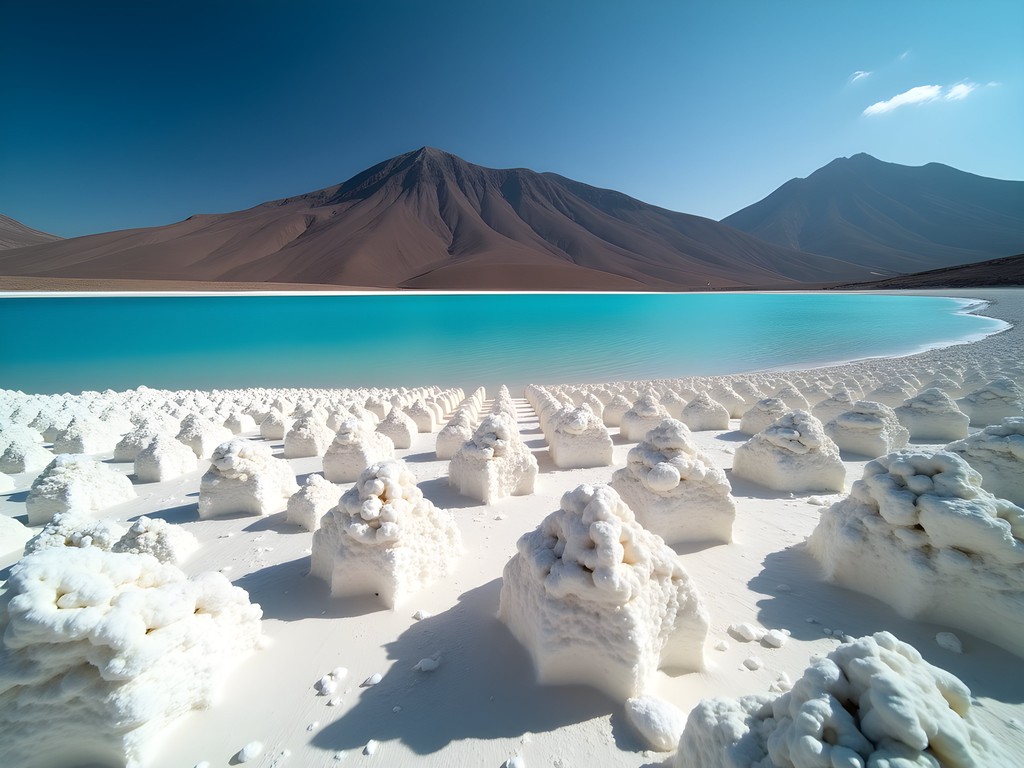
💡 Pro Tips
- Form groups with other travelers to share transportation costs
- Pack high-SPF sunscreen – the reflection from salt flats intensifies sun exposure dramatically
- Bring twice as much water as you think you'll need – dehydration happens quickly here
Budget-Friendly Red Sea Adventures
Djibouti's underwater world rivals its terrestrial wonders, with the Gulf of Tadjoura offering some of the most affordable whale shark encounters on the planet. From November to February, these gentle giants feed in the gulf's plankton-rich waters. While tourist boats charge upwards of $100, I found a local fisherman at Plage des Sables Blancs who took me out for 3000 DJF ($17) when he wasn't working his usual routes.
The experience was gloriously unstructured – no crowds, no time limits, just me and a massive whale shark gliding through crystal waters. For these aquatic adventures, my dry bag protected my camera gear and documents from both splashes on the boat and the unexpected waves at beach camps.
For beach accommodation, skip the luxury resorts and head to Khor Ambado where basic beach huts run about 2500 DJF ($14) per night. The facilities are minimal – often just a bed with mosquito netting and shared bathrooms – but you'll fall asleep to the sound of waves and wake up with the Red Sea literally steps from your door.
Snorkeling gear rental costs around 500 DJF ($2.80) daily from beachside vendors, but I brought my own full-face snorkel mask which provided better visibility and comfort for extended underwater exploration. The coral reefs just offshore teem with marine life that rivals more famous destinations I've visited in Southeast Asia, yet you'll often have entire sections of reef completely to yourself.
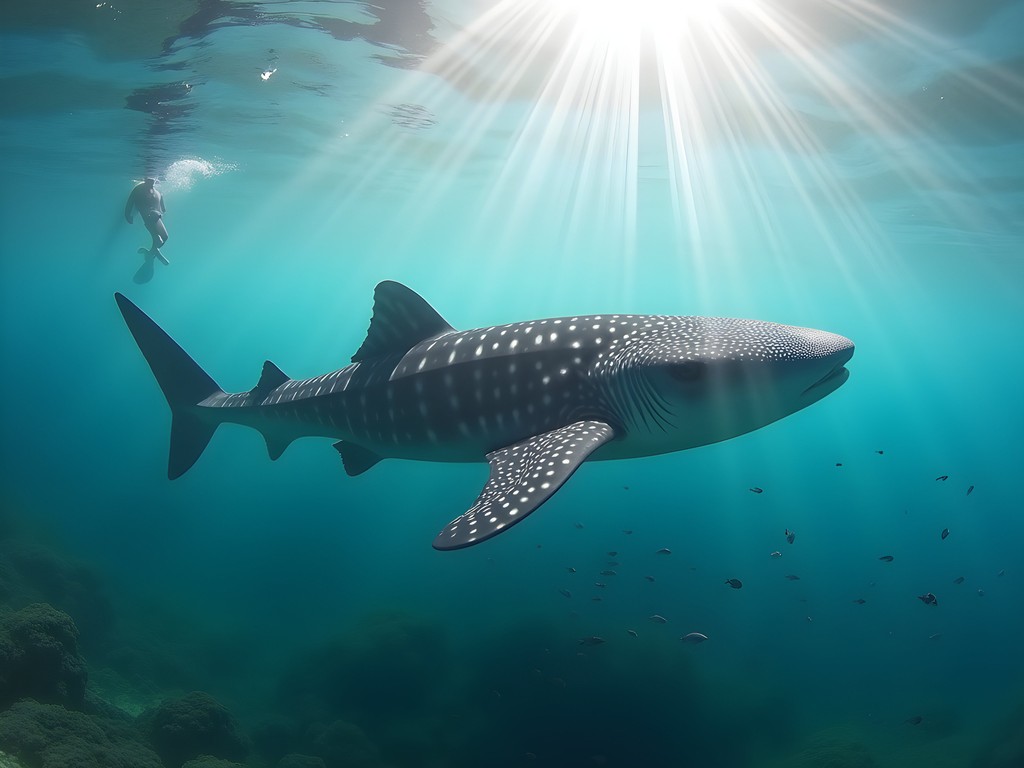
💡 Pro Tips
- Arrange boat trips directly with fishermen early in the morning at the docks
- Bring your own reef-safe sunscreen – it's not available locally
- Visit beaches midweek to avoid the local weekend crowds
Night Markets & Budget Feasts
As someone who's documented nightlife spaces across four continents, I was particularly drawn to how Djibouti's food scene transforms after dark. The night market near Place Mahmoud Harbi erupts with activity around 8pm, when temperatures finally drop to comfortable levels. Plastic tables and chairs appear seemingly from nowhere, charcoal grills are lit, and the air fills with the intoxicating aroma of yemeni spices and grilling meats.
This is where Djibouti's complex cultural identity – part East African, part Middle Eastern, with French colonial influences – manifests most deliciously on your plate. A full meal of grilled fish, flatbread, and spiced rice rarely exceeds 1000 DJF ($5.60), while fresh mango juice costs just 100 DJF ($0.56) per glass. The vendors here cater primarily to locals, not tourists, so prices remain honest and portions generous.
For late-night exploration, I relied on my compact flashlight – Djibouti City's street lighting is inconsistent at best, and navigating the labyrinthine alleys of the African Quarter after dark requires reliable illumination. The flashlight's adjustable brightness proved perfect for both practical navigation and capturing the moody ambiance in my nighttime photography.
The architectural contrasts become even more pronounced after dark, when modern buildings fade into shadow while traditional structures are often highlighted by string lights and lanterns. My surveyor's training helped me map mental pathways through these complex urban spaces, noticing how centuries-old Ottoman-influenced buildings have been repurposed for modern commerce without losing their historical character.
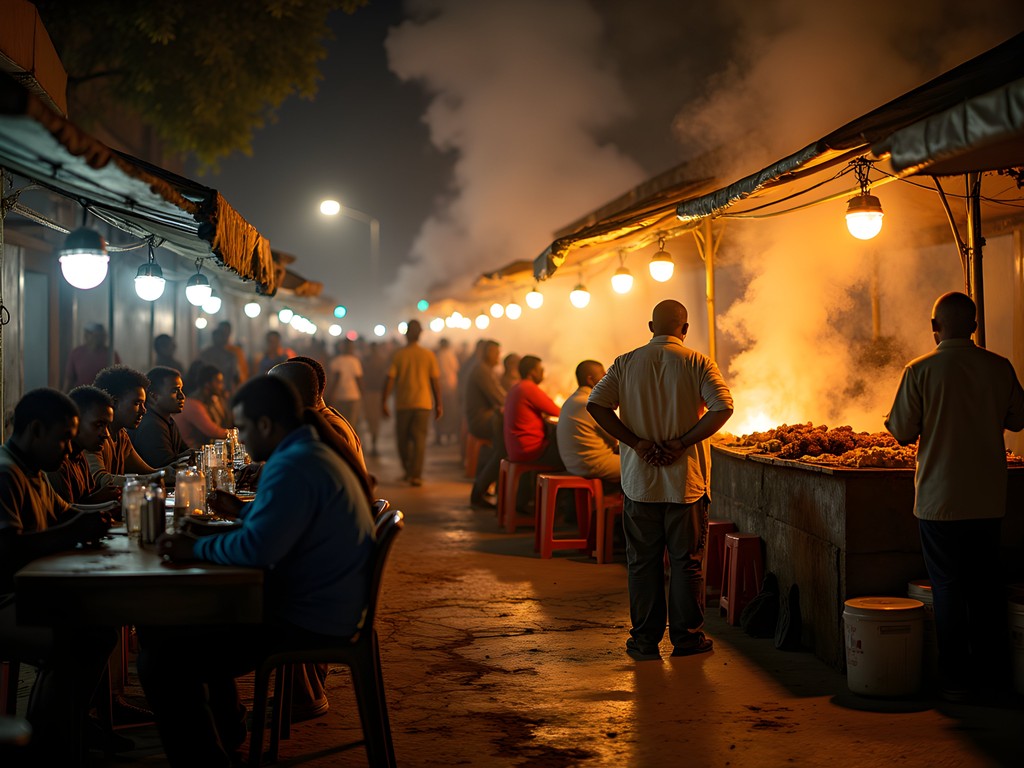
💡 Pro Tips
- Eat where locals gather in groups – it's the best indicator of quality food
- Carry hand sanitizer as handwashing facilities are limited at night markets
- Learn the phrase 'la sucre, s'il vous plaît' (no sugar, please) unless you want extremely sweetened tea
Final Thoughts
As my week in Djibouti drew to a close, sitting at a small café near Les Corniches watching fishermen mend their nets against a backdrop of container ships and distant mountains, I reflected on how this tiny nation defies easy categorization. It's neither fully African nor Middle Eastern, neither completely developing nor developed – it exists in fascinating liminal spaces that make it perfect for travelers seeking authentic experiences without tourist infrastructure markup.
Djibouti demands flexibility and cultural sensitivity but rewards budget travelers with experiences that feel genuinely exploratory in an increasingly homogenized travel landscape. The country's geological extremes – from below-sea-level salt flats to volcanic highlands – mirror its cultural contrasts, creating a destination that challenges and excites in equal measure. As a surveyor accustomed to mapping physical spaces, I found myself equally engaged in mapping the invisible boundaries between Djibouti's multiple cultural identities, watching how they blend and separate across urban and rural environments.
For students and budget travelers willing to embrace some discomfort and navigate beyond the obvious, Djibouti offers rare value in today's travel landscape – a place where $30 a day buys not just subsistence but genuine adventure. Pack light, prepare thoroughly, and approach with respect – Djibouti will handle the rest.
✨ Key Takeaways
- Djibouti offers extraordinary budget value with natural wonders and cultural experiences accessible for under $30/day
- Local transportation and food options save significant money while providing more authentic experiences
- Winter months (November-February) offer ideal temperatures and whale shark encounters
- Forming connections with locals unlocks hidden experiences no guidebook can reveal
- The country's compact size allows exploration of diverse landscapes within a short timeframe
📋 Practical Information
Best Time to Visit
November to February (winter)
Budget Estimate
$25-35 per day
Recommended Duration
5-7 days
Difficulty Level
Advanced

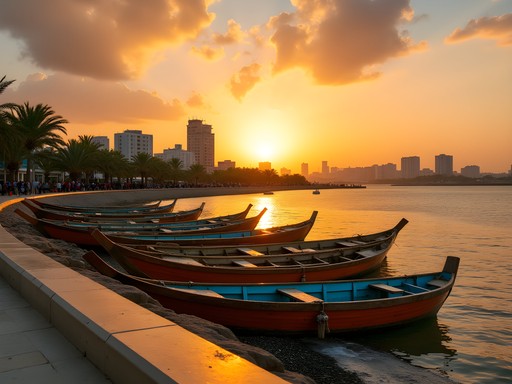
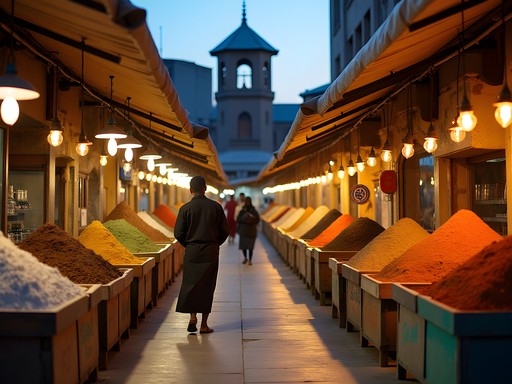
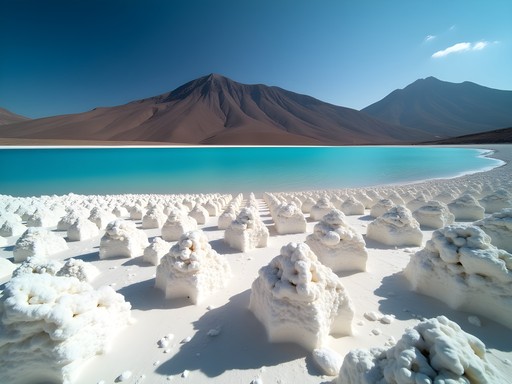
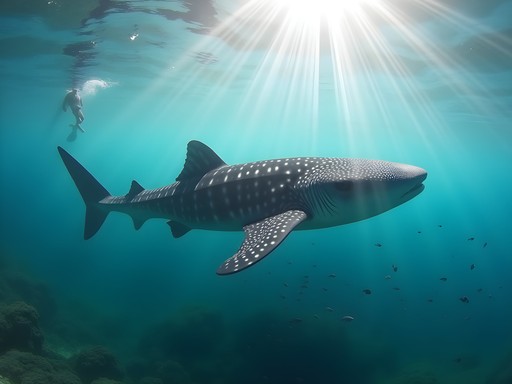
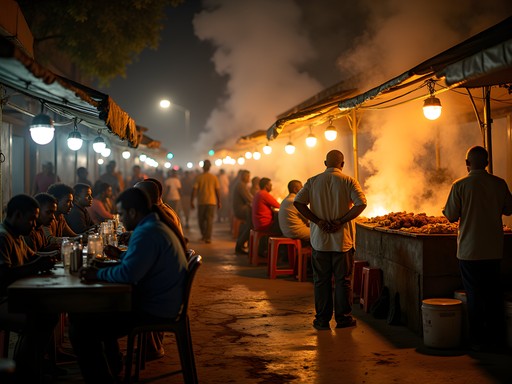



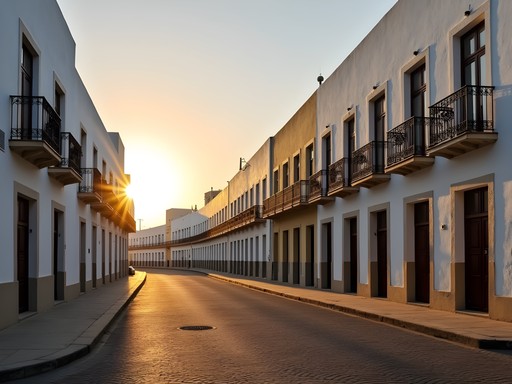
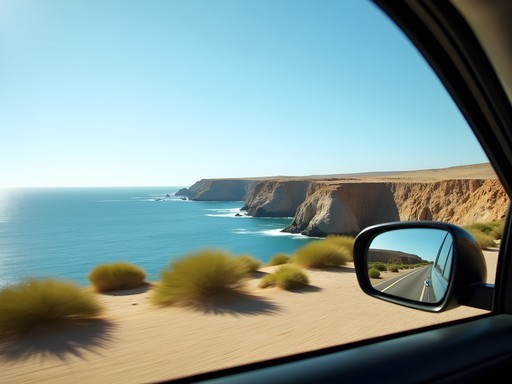
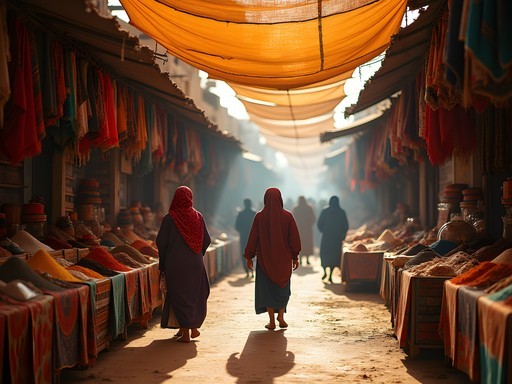

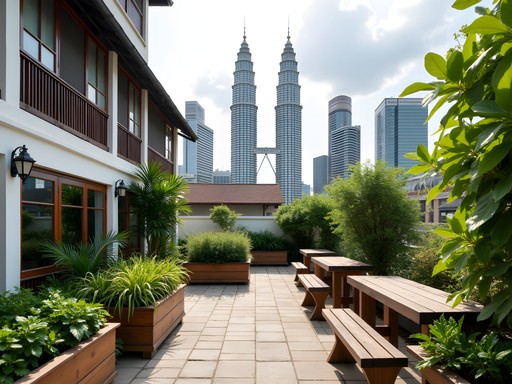
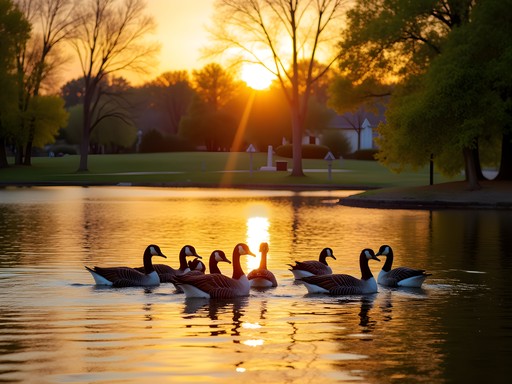
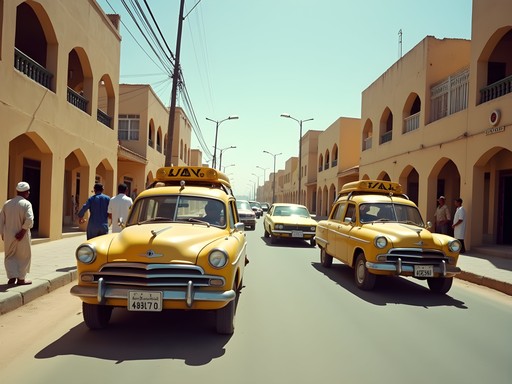
Comments
waveace
Going there in September!! Any tips on getting from the airport to the city cheap? Also is it easy to find vegetarian food?
sunsetlegend
Not OP but I've been researching this - shared taxis from airport are way cheaper than private transfers!
Sage Dixon
Gregory, this is fantastic! I spent three weeks in the Horn of Africa last year but skipped Djibouti thinking it was out of my budget range. Huge mistake apparently! Your section about the local buses from the markets really resonated - I've found some of my best travel experiences happen when you ditch the tourist transport and just figure out how locals actually move around. The geological stuff sounds incredible too. Did you manage to get out to Day Forest at all, or did you stick mainly to the salt lakes and coastal areas? I'm planning a return trip to the region and seriously considering adding Djibouti this time around.
waveace
How much did you budget per day if you don't mind me asking?
sunsetlegend
THIS IS GOING ON MY LIST!! Never even considered Djibouti before but Lac Assal looks absolutely insane!! 🔥🔥
beachphotographer
Wait, Djibouti can be done on a budget?? Mind blown
Sage Dixon
Right?? I always thought it was super expensive because of all the military bases. Gregory's post totally changed my perspective on it.
cityperson
Just booked my flights to Djibouti after reading this! Any recommendations for budget accommodations in Djibouti City? I'm trying to keep it under $30/night if possible. Also, did you need any special vaccinations before going? The travel clinic is quoting me some pretty steep prices for shots.
budget_explorer
Just got back from Djibouti and used many of your tips! For anyone going soon, prices have gone up a bit at the markets, but still very reasonable. The shared taxi to Lac Assal was 15€ per person now, not 10€ as mentioned. Still worth every penny!
Gregory Webb
Thanks for the update on prices! Always helpful to have recent info.
redmood
That photo of Lac Assal is stunning! Definitely adding this to my bucket list.
Taylor Moreau
Excellent write-up, Gregory. For those planning extended stays, I'd add that the Sheraton and Kempinski offer day passes to their pools and facilities for around $25-30, which is a worthwhile splurge when you need a break from the heat. Also, if you're doing any business in Djibouti, the Chamber of Commerce near the port has surprisingly good WiFi and a quiet workspace. The country is positioning itself as the logistics hub for East Africa, so infrastructure is improving rapidly. Worth noting that French is more useful than English outside the main tourist areas.
dreamguy5215
Great post! I've been researching off-the-beaten-path destinations and Djibouti wasn't even on my radar. Those markets sound amazing. Did you feel like a week was enough time? Also wondering about internet access since I need to check in with work occasionally. Were you able to get decent wifi or cell service?
citydiver
Did you do any liveaboards or just day diving? Been researching Red Sea diving and Djibouti keeps coming up as way cheaper than Egypt or Sudan. Any dive shop recommendations?
Venture X
Premium card with 2X miles, $300 travel credit, Priority Pass